In this comprehensive guide, we'll explore 75 diverse ways to express farewell in French, from formal “au revoirs” to casual “saluts,” and everything in between.
Fore sure, how do you say goodbye in french ? We'll cover when and how to use each phrase, ensuring you're equipped to say goodbye confidently in any situation – be it a high-stakes business setting or a casual encounter with friends.
How to say goodbye in French in 75 ways
Expressing farewell in French goes far beyond a simple “au revoir”. The way you say goodbye can vary greatly depending on the formality of the situation, your relationship with the person, and even the time of day.
For instance, 'Salut' is a French word used as an informal greeting and farewell among friends, best reserved for familiar connections rather than formal situations. Let’s explore the myriad ways to bid adieu in French.
Formal ways to say goodbye in French
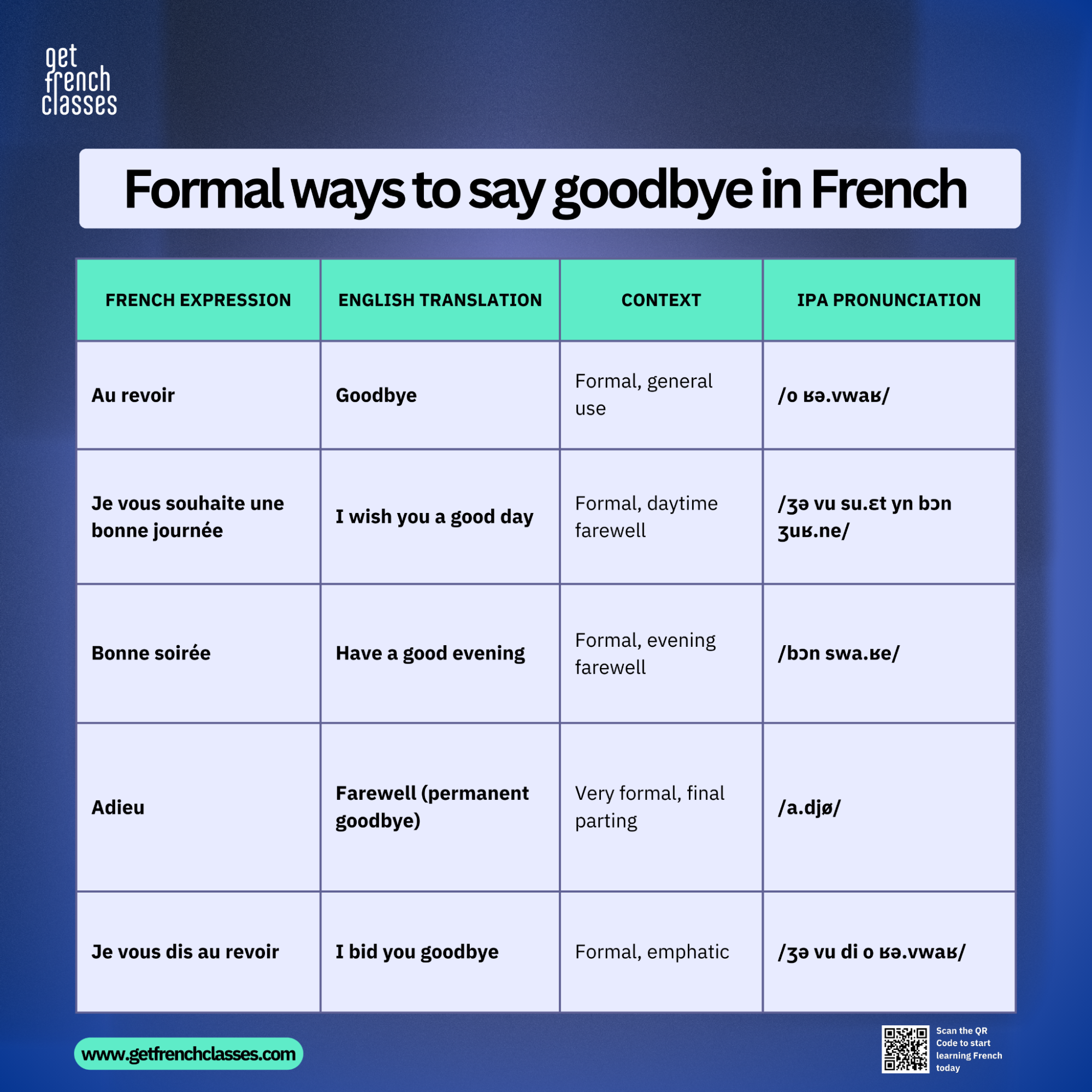
In formal situations, such as business meetings, official events, or when addressing people you don't know well or who are in positions of authority, it's important to use more polite and elaborate a few expressions of farewell.
| French Expression | English Translation | Context | IPA Pronunciation |
|---|---|---|---|
| Au revoir | Goodbye | Formal, general use | /o ʁə.vwaʁ/ |
| Je vous souhaite une bonne journée | I wish you a good day | Formal, daytime farewell | /ʒə vu su.ɛt yn bɔn ʒuʁ.ne/ |
| Bonne soirée | Have a good evening | Formal, evening farewell | /bɔn swa.ʁe/ |
| Adieu | Farewell (permanent goodbye) | Very formal, final parting | /a.djø/ |
| Je vous dis au revoir | I bid you goodbye | Formal, emphatic | /ʒə vu di o ʁə.vwaʁ/ |
-
At the end of a business meeting: " Au revoir, Monsieur. Je vous souhaite une excellente journée. " ( Goodbye, Sir. I wish you an excellent day. )
This combination of "au revoir" with a formal well-wish is standard in professional settings. It shows respect and leaves a positive impression.
-
Leaving a formal event in the evening: Bonne soirée, Madame. Merci pour votre accueil. À Mardi. Have a good evening, Madam. Thank you for your hospitality. See you on Tuesday.
"Bonne soirée" is appropriate for evening farewells and can be combined with a full expression of gratitude for added politeness.
-
In a situation of permanent departure: Adieu, mes chers collègues. Ce fut un plaisir de travailler avec vous. À un de ces quatre. Bonne continuation. Farewell, my dear colleagues. It was a pleasure working with you. See you when I see you. "Adieu" is reserved for final goodbyes when you don't expect to see the person again. It carries a sense of finality and should be used sparingly.
-
Ending a formal phone call:
Je vous dis au revoir et vous remercie de votre temps. I bid you goodbye and thank you for your time.
This more elaborate form of goodbye is suitable for formal phone conversations, especially in business contexts. It combines the farewell with an expression of gratitude.
Casual and everyday goodbye expressions in the French language
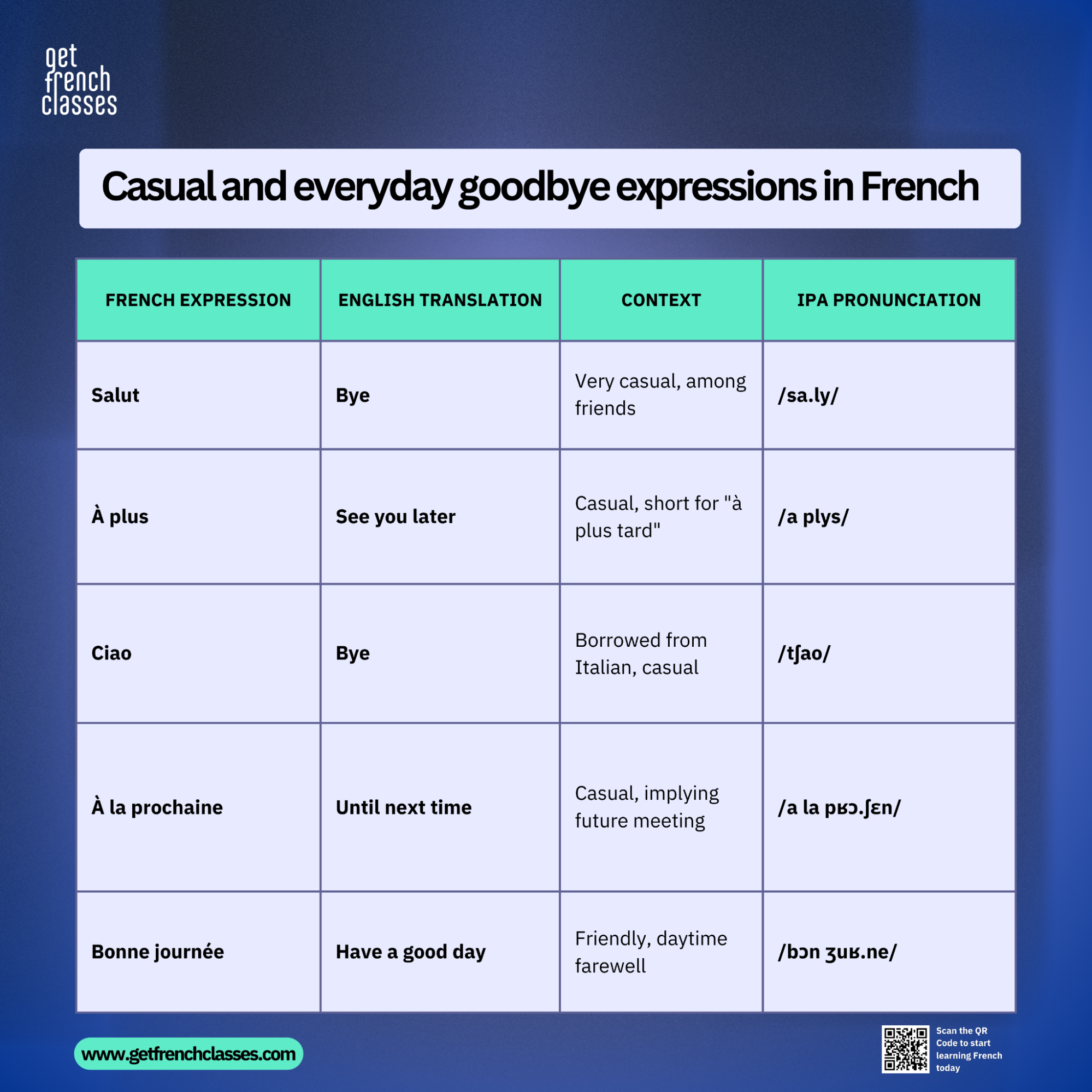
For everyday situations with friends, family, or in informal settings, you can use more relaxed expressions to say goodbye.
These casual french farewells are perfect for daily use and will help you sound more natural in conversational French. 'Bon après-midi' is an appropriate farewell expression for the afternoon, equivalent to 'good afternoon' in English.
| French Expression | English Translation | Context | IPA Pronunciation |
|---|---|---|---|
| Salut | Bye | Very casual, among friends | /sa.ly/ |
| À plus | See you later | Casual, short for "à plus tard" | /a plys/ |
| Ciao | Bye | Borrowed from Italian, casual | /tʃao/ |
| À la prochaine | Until next time | Casual, implying future meeting | /a la pʁɔ.ʃɛn/ |
| Bonne journée | Have a good day | Friendly, daytime farewell | /bɔn ʒuʁ.ne/ |
Examples and explanations:
-
Leaving a group of friends after hanging out:
Salut tout le monde, à plus ! Bye everyone, see you later!
“Salut” is very informal and is often used among close friends or peers. Combining it with “à plus” is a common way to say goodbye casually while implying you’ll see each other again soon.
2. Ending a phone call with a family member:
Bon, je dois y aller. Ciao ! Well, I have to go. Bye!
“Ciao” has been adopted into French from Italian and is widely used in casual settings. It’s a quick and friendly way to end a conversation.
3. Saying goodbye to a colleague after work:
Bonne soirée, à la prochaine ! Have a good evening, until next time!
“À la prochaine” is a friendly way to say bye in French when you expect to see the person again. It’s less specific than “see you tomorrow” but implies future interaction.
Remember, these casual goodbyes should be used only in informal situations. Using them in a formal context could be seen as disrespectful or overly familiar.
Expressing deep sentiment in French farewells
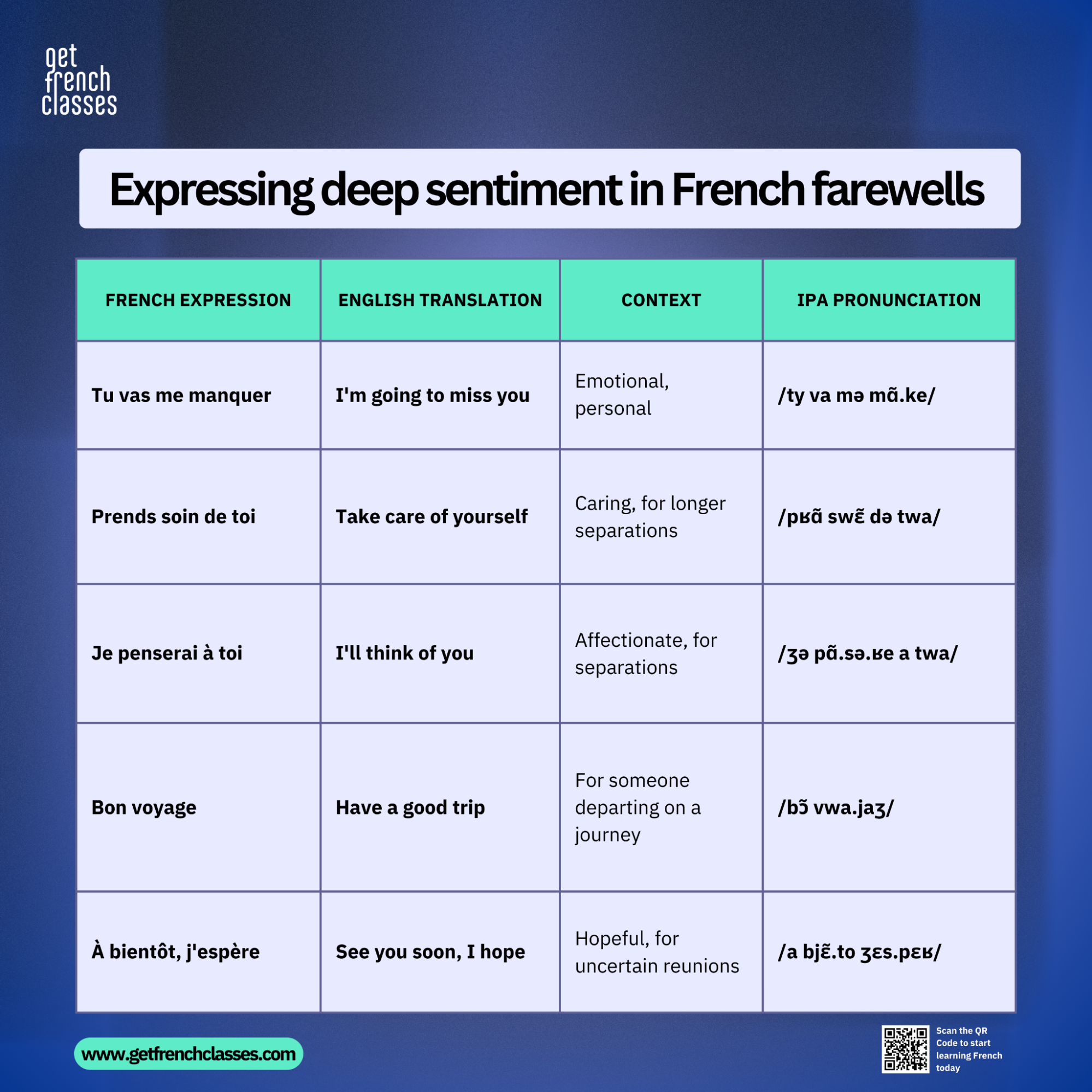
When saying goodbye in emotionally charged situations or for longer separations, French offers several heartfelt expressions to convey deeper sentiments. These common phrases are perfect for expressing care and affection in your farewells.
| French Expression | English Translation | Context | IPA Pronunciation |
|---|---|---|---|
| Tu vas me manquer | I'm going to miss you | Emotional, personal | /ty va mə mɑ̃.ke/ |
| Prends soin de toi | Take care of yourself | Caring, for longer separations | /pʁɑ̃ swɛ̃ də twa/ |
| Je penserai à toi | I'll think of you | Affectionate, for separations | /ʒə pɑ̃.sə.ʁe a twa/ |
| Bon voyage | Have a good trip | For someone departing on a journey | /bɔ̃ vwa.jaʒ/ |
| À bientôt, j'espère | See you soon, I hope | Hopeful, for uncertain reunions | /a bjɛ̃.to ʒɛs.pɛʁ/ |
Examples and cultural context:
-
Saying goodbye to a close friend moving abroad: Tu vas vraiment me manquer. Prends soin de toi et donne-moi de tes nouvelles. I'm really going to miss you. Take care of yourself and keep in touch. In French culture, expressing that you'll miss someone is a sign of deep affection. "Prends soin de toi" shows genuine care for the person's well-being.
-
Bidding farewell to family before a long trip: Bon voyage ! Je penserai à vous tous les jours. Have a good trip! I'll think of you every day. "Bon voyage" is a classic French expression used when someone is embarking on a journey. Adding "Je penserai à vous" emphasizes the emotional connection despite the distance.
-
Saying goodbye after a reunion, unsure when you'll meet again: À bientôt, j'espère. Tu me manques déjà. See you soon, I hope. I miss you already.
This combination expresses both hope for a future meeting and immediate feelings of missing the person. It's a touching way to end a reunion in French culture.
French goodbye slang and youth expressions
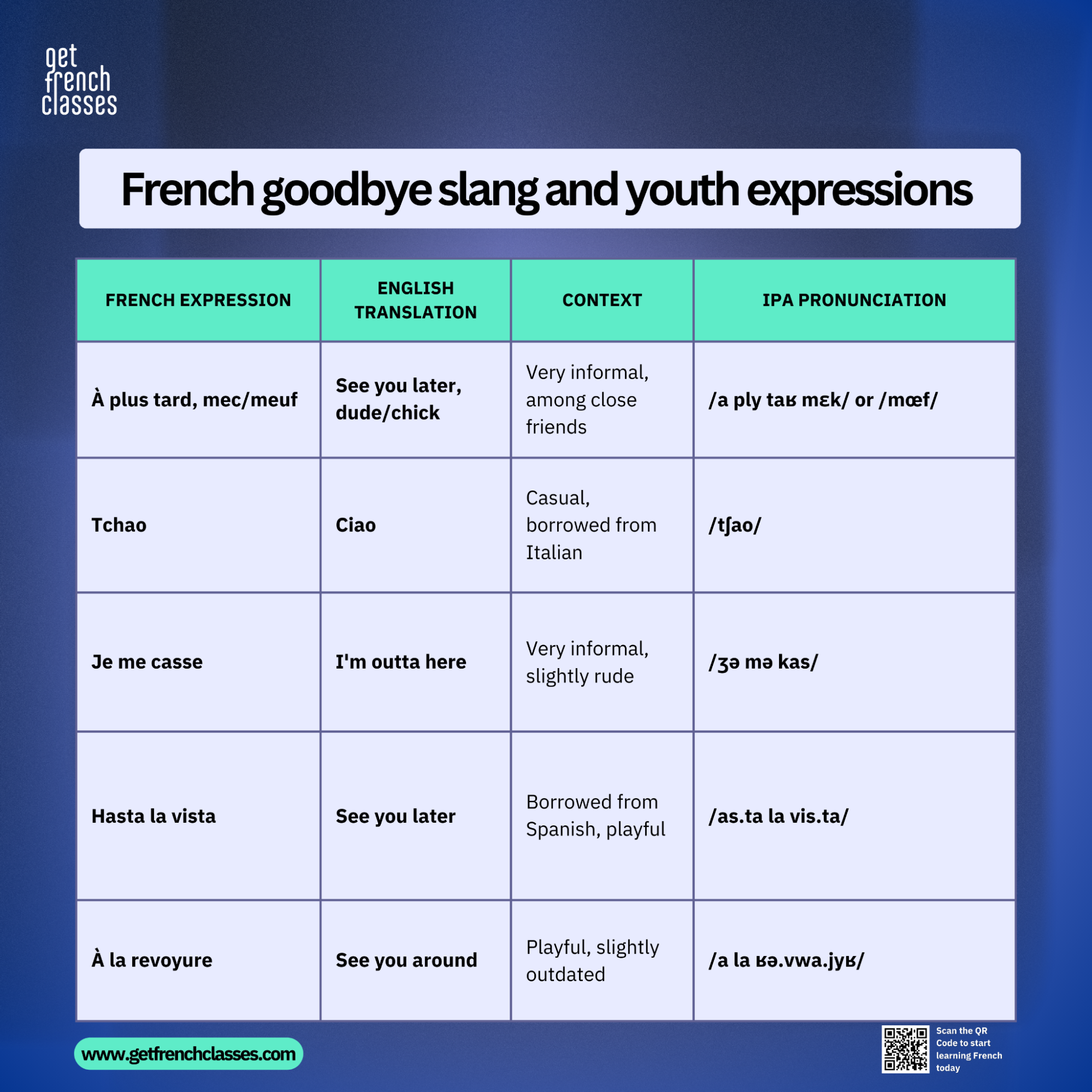
Younger French speakers and those in casual settings often use slang expressions to say goodbye. These are informal and should be used carefully, as they may not be appropriate in all contexts.
| French Expression | English Translation | Context | IPA Pronunciation |
|---|---|---|---|
| À plus tard, mec/meuf | See you later, dude/chick | Very informal, among close friends | /a ply taʁ mɛk/ or /mœf/ |
| Tchao | Ciao | Casual, borrowed from Italian | /tʃao/ |
| Je me casse | I'm outta here | Very informal, slightly rude | /ʒə mə kas/ |
| Hasta la vista | See you later | Borrowed from Spanish, playful | /as.ta la vis.ta/ |
| À la revoyure | See you around | Playful, slightly outdated | /a la ʁə.vwa.jyʁ/ |
Examples and generational context:
-
Leaving a party with friends: Bon, je me casse. À plus tard, les mecs ! Well, I'm outta here. See you later, guys!
This combination of "je me casse" and "à plus tard" is very casual way and commonly used among younger people, especially in their late teens and twenties. It's not appropriate for formal settings, in which "Je m'en vais," is the most appropriate solution.
2. Saying goodbye to classmates after school: Tchao tout le monde, à demain ! Ciao everyone, see you tomorrow!
"Tchao" is a popular, casual goodbye among French youth. It's a trendy alternative to "salut" and is widely used in schools and universities.
3. Parting ways after a night out: Hasta la vista, les amis ! C'était cool ! See you later, friends! It was cool!
Using foreign expressions like "Hasta la vista" is popular among younger French speakers. It adds a playful, international flair to their goodbyes.
Regional ways to say goodbye in French-speaking countries
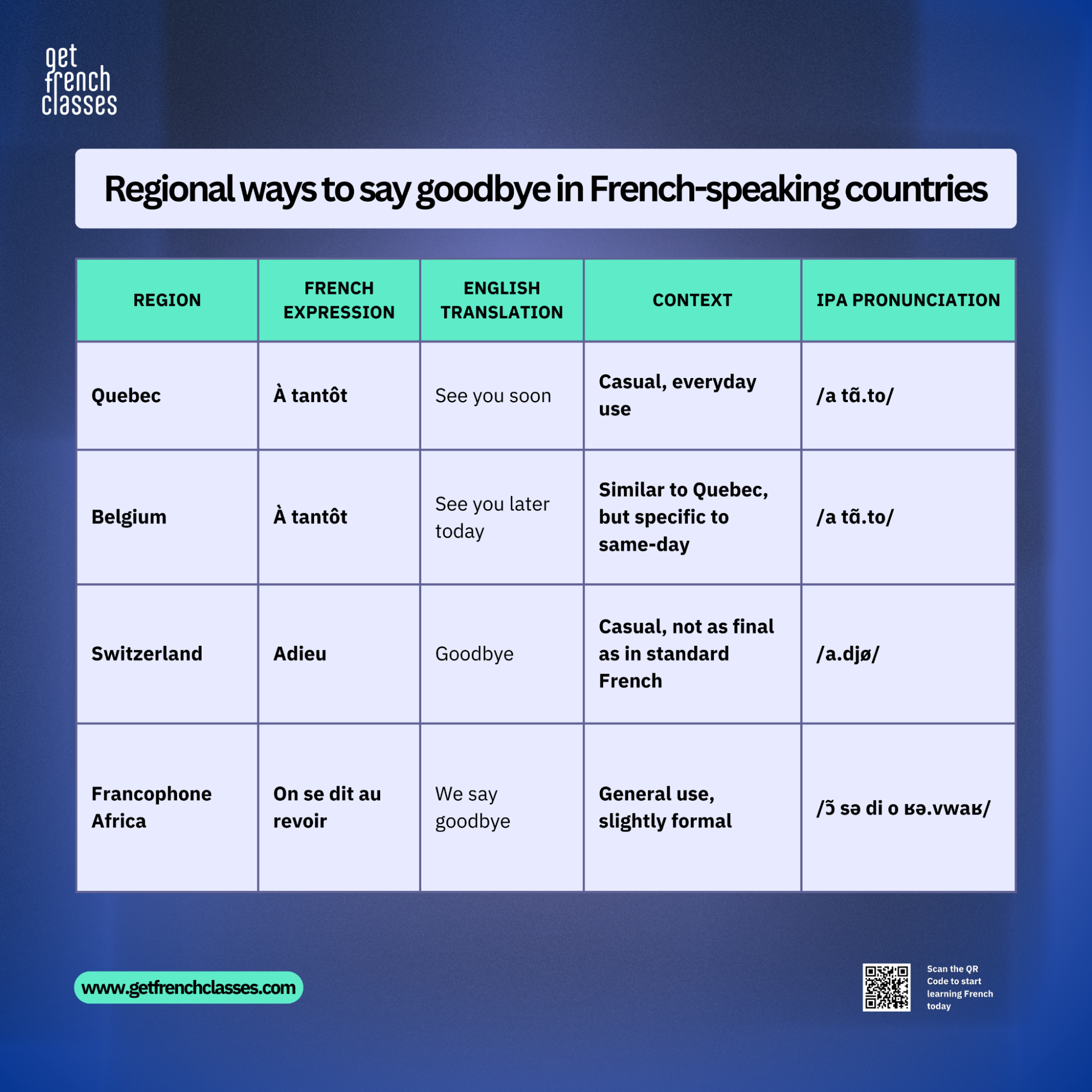
French is spoken in many countries around the world, and each region has developed its own unique farewell expressions. Let's explore some ways to say goodbye in Canada (particularly Quebec), Belgium, Switzerland, and Francophone Africa.
| Region | French Expression | English Translation | Context | IPA Pronunciation |
|---|---|---|---|---|
| Quebec | À tantôt | See you soon | Casual, everyday use | /a tɑ̃.to/ |
| Belgium | À tantôt | See you later today | Similar to Quebec, but specific to same-day | /a tɑ̃.to/ |
| Switzerland | Adieu | Goodbye | Casual, not as final as in standard French | /a.djø/ |
| Francophone Africa | On se dit au revoir | We say goodbye | General use, slightly formal | /ɔ̃ sə di o ʁə.vwaʁ/ |
Examples and cultural insights:
-
In Quebec, Canada: After a morning meeting with colleagues Parfait, à tantôt pour le dîner ! Perfect, see you soon for lunch!
In Quebec French, "à tantôt" is very common and can mean "see you soon" or "see you later," regardless of whether you'll actually meet again the same day. "Dîner" in Quebec refers to lunch, not dinner as in France.
2. In Belgium: Leaving work for a lunch break Je vais manger, à tantôt ! I'm going to eat, see you later!
While "à tantôt" exists in Belgium too, it specifically means you'll see the person later the same day. This differs from its usage in Quebec.
3. In Switzerland: Saying goodbye to a shopkeeper Merci beaucoup, adieu, bonne chance et bon courage ! Thank you very much, good luck and goodbye!
In Swiss French, "adieu" is used as a casual goodbye, unlike in standard French where it implies a final farewell. It's closer in meaning to "au revoir" in this context.
4. In Senegal): Ending a formal conversation "On se dit au revoir et à bientôt, inch'Allah." (We say goodbye and see you soon, God willing.)
"On se dit au revoir" is a common phrase in many African French-speaking countries. The addition of "inch'Allah" (God willing) reflects the influence of Islamic culture in many of these regions.
How to say goodbye in French for specific situations
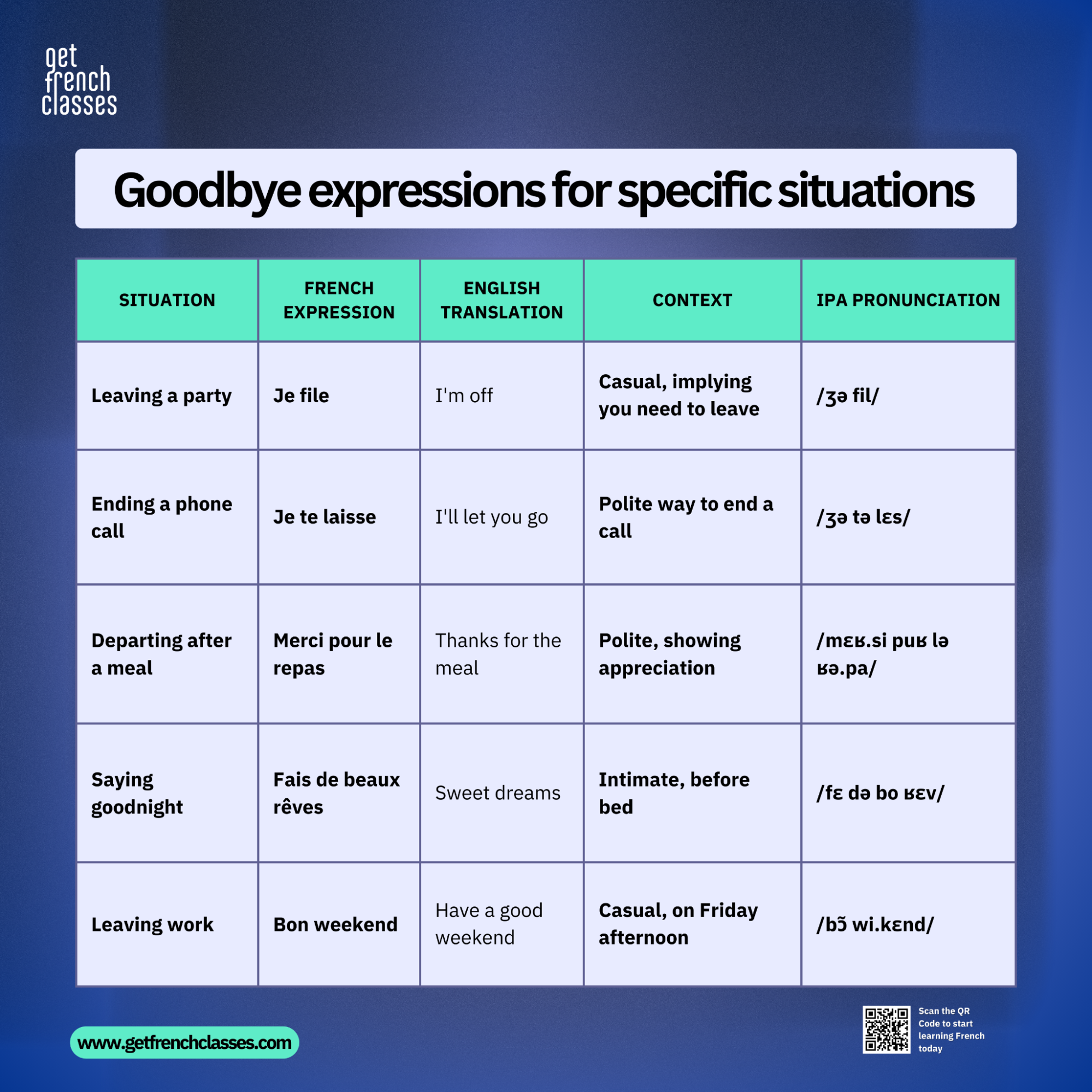
Different scenarios call for different ways of saying goodbye in French. Here are some expressions tailored for specific contexts like leaving a party, ending a phone call, or departing after a meal.
| Situation | French Expression | English Translation | Context | IPA Pronunciation |
|---|---|---|---|---|
| Leaving a party | Je file | I'm off | Casual, implying you need to leave | /ʒə fil/ |
| Ending a phone call | Je te laisse | I'll let you go | Polite way to end a call | /ʒə tə lɛs/ |
| Departing after a meal | Merci pour le repas | Thanks for the meal | Polite, showing appreciation | /mɛʁ.si puʁ lə ʁə.pa/ |
| Saying goodnight | Fais de beaux rêves | Sweet dreams | Intimate, before bed | /fɛ də bo ʁɛv/ |
| Leaving work | Bon weekend | Have a good weekend | Casual, on Friday afternoon | /bɔ̃ wi.kɛnd/ |
Examples and etiquette tips:
-
At a party, when you need to leave: Désolé, je file. Merci pour cette super soirée ! Sorry, I'm off. Thanks for this great evening!
Etiquette tip : It's polite to thank the host and say goodbye to close friends individually. For larger gatherings, a general goodbye to the group is acceptable.
2. Ending a phone call with a friend: Bon, je te laisse. À ce soir! Well, I'll let you go. Let's call each other tonight!
Etiquette tip : "Je te laisse" is a polite way to initiate the end of a call. It's less abrupt than saying you have to go and implies consideration for the other person's time.
3. After dining at someone's home: Merci beaucoup pour le délicieux repas. C'était une soirée charmante. Thank you very much for the delicious meal. It was a lovely evening.
Etiquette tip : In French culture, it's important to thank your host for their hospitality, especially regarding the meal. A compliment about the food or the evening in general is always appreciated.
4. Saying goodnight to a partner or close family member: Bonne nuit, fais de beaux rêves. Good night, sweet dreams.
Etiquette tip : This intimate expression is reserved for close relationships. For acquaintances or in less personal settings, a simple "Bonne nuit" (Good night) is more appropriate.
5. Leaving work on Friday: " Bon weekend à tous, à la semaine prochaine ! Reposez-vous bien. " ( Have a good weekend everyone! Rest well. )
Etiquette tip : It's common in French workplaces to wish colleagues a good weekend on Friday afternoons. This helps maintain a friendly, collegial atmosphere.
Expressing goodbye in written French
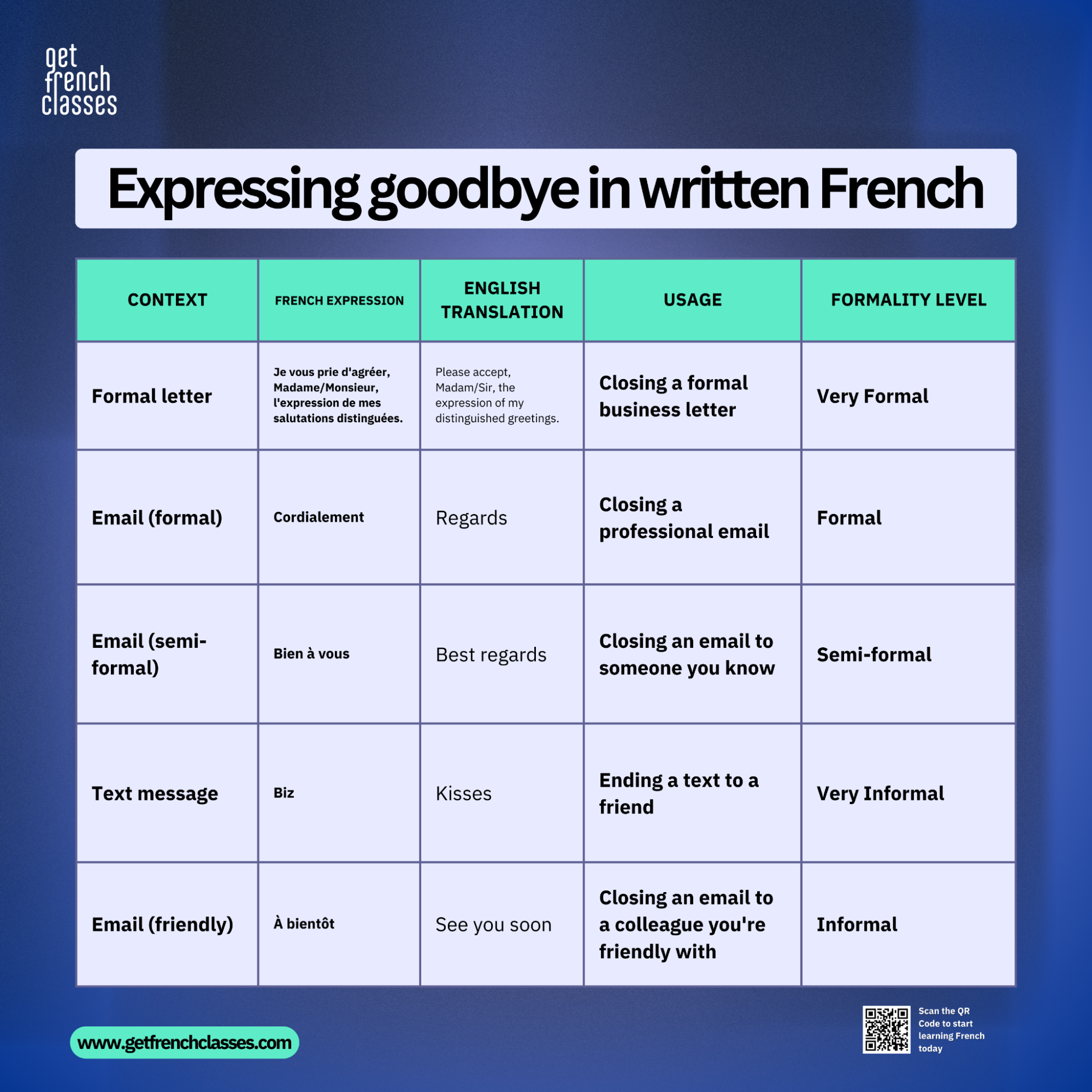
Written goodbyes in French vary depending on the formality of the communication. Here's how to close letters, emails, and text messages appropriately.
| Context | French Expression | English Translation | Usage | Formality Level |
|---|---|---|---|---|
| Formal letter | Je vous prie d'agréer, Madame/Monsieur, l'expression de mes salutations distinguées. | Please accept, Madam/Sir, the expression of my distinguished greetings. | Closing a formal business letter | Very Formal |
| Email (formal) | Cordialement | Regards | Closing a professional email | Formal |
| Email (semi-formal) | Bien à vous | Best regards | Closing an email to someone you know | Semi-formal |
| Text message | Biz | Kisses | Ending a text to a friend | Very Informal |
| Email (friendly) | À bientôt | See you soon | Closing an email to a colleague you're friendly with | Informal |
Examples and usage notes:
-
Formal letter closing: " Je vous prie d'agréer, [Madame/Monsieur], l'expression de mes salutations distinguées. [Your Name] "
Usage note : This very formal closing is standard for official letters or job applications. Note that you can't use this phrase at the end of a job interview. The choice between "Madame" and "Monsieur" should match the salutation at the beginning of the letter.
2. Professional email sign-off:
" Cordialement,
[Your Name] "
Usage note : "Cordialement" is widely used in professional contexts. It's formal enough for business communications but not as stiff as letter closings.
3. Semi-formal email closing:
" Bien à vous,
[Your Name] "
Usage note : This is slightly warmer than "Cordialement" and is suitable for emails to people you have a good professional relationship with, but aren't close friends.
4. Text message to a friend:
" Ok super ! Biz "
Usage note : "Biz" is very casual and should only be used with close friends. It's an abbreviated form of "bises" (kisses) and is common in text messages.
5. Friendly email to a colleague:
" À bientôt,
[Your First Name] "
Usage note : This informal closing is suitable for emails to colleagues you have a friendly relationship with. Using just your first name adds to the casual tone.
Remember, in French written communication, the level of formality is crucial. Always consider your relationship with the recipient and the context of your message when choosing a closing. When in doubt, it's safer to err on the side of formality, especially in professional contexts.
Responding to "Goodbye" in French
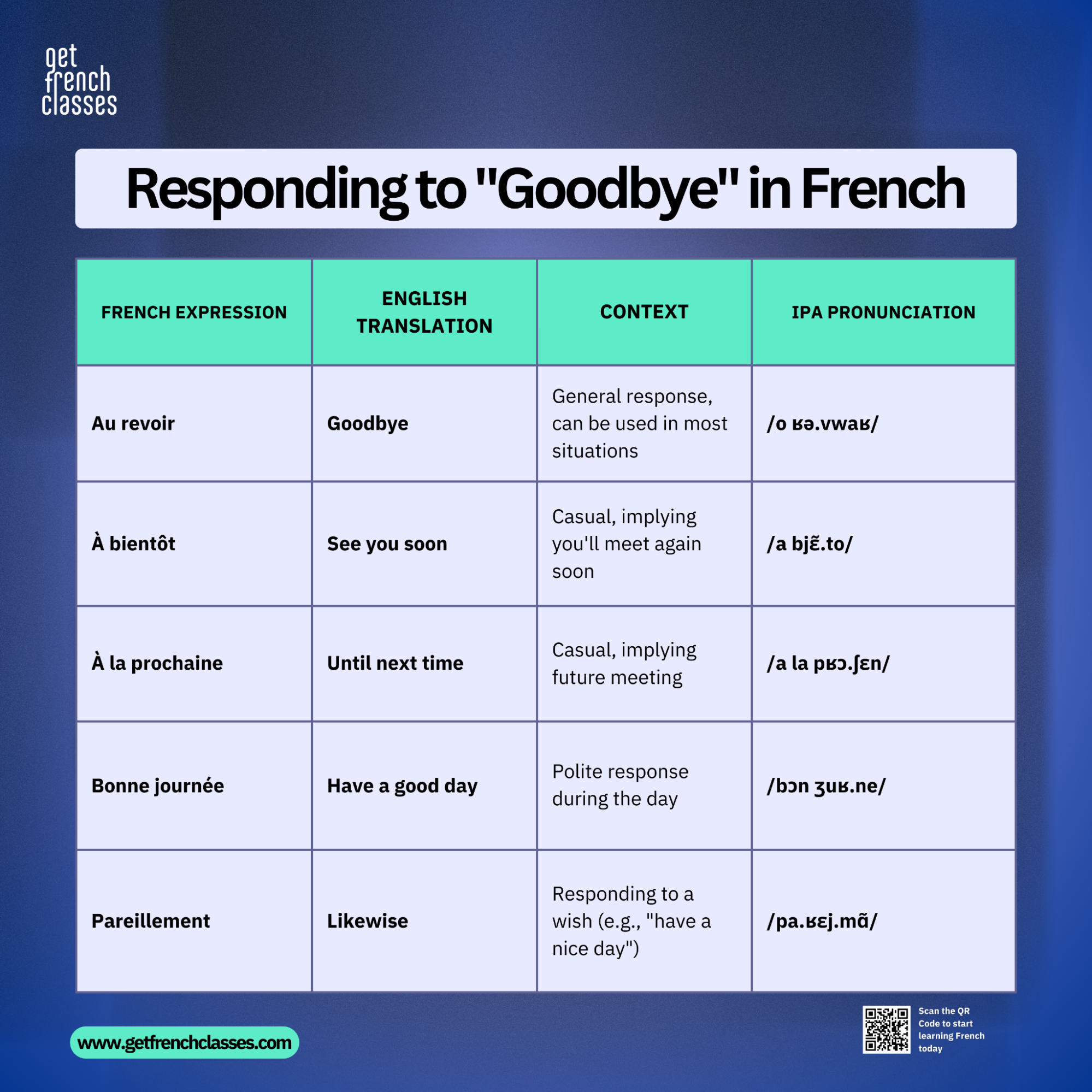
Knowing how to respond when someone says goodbye is just as important as knowing how to say goodbye yourself. In French, there are various ways to reply to "au revoir" or other farewell expressions, depending on the context and level of formality.
| French Expression | English Translation | Context | IPA Pronunciation |
|---|---|---|---|
| Au revoir | Goodbye | General response, can be used in most situations | /o ʁə.vwaʁ/ |
| À bientôt | See you soon | Casual, implying you'll meet again soon | /a bjɛ̃.to/ |
| À la prochaine | Until next time | Casual, implying future meeting | /a la pʁɔ.ʃɛn/ |
| Bonne journée | Have a good day | Polite response during the day | /bɔn ʒuʁ.ne/ |
| Pareillement | Likewise | Responding to a wish (e.g., "have a nice day") | /pa.ʁɛj.mɑ̃/ |
Examples and usage tips:
-
In a formal setting:
-
Person A : " Au revoir, Monsieur. Bonne journée. "
-
Person B : " Au revoir. Bonne journée à vous aussi. "
Usage tip : In formal situations, it's polite to echo the goodbye and return any well-wishes. The use of "vous" maintains the formal tone.
2. Among friends:
-
Friend A : " Allez, salut ! À plus ! "
-
Friend B : " Ouais, à plus tard ! "
Usage tip : With friends, you can use casual expressions like "à plus" (see you later). Matching the tone of the initial goodbye keeps the exchange natural and friendly.
3. After a business meeting:
-
Colleague A : " Au revoir, merci pour cette réunion productive. "
-
Colleague B : " Merci à vous. À bientôt. "
Usage tip : In professional contexts, it's good to acknowledge any expression of gratitude and indicate the possibility of future interactions with phrases like "à bientôt" (see you soon).
4. Responding to well-wishes:
-
Person A : " Au revoir, passez une bonne soirée. "
-
Person B : " Merci, vous aussi. Au revoir. "
Usage tip : When someone wishes you well as part of their goodbye, it's polite to thank them and return the sentiment. "Vous aussi" (you too) is a quick way to do this.
5. Ending a phone call:
-
Caller A : " Bon, je vais vous laisser. Au revoir. "
-
Caller B : " D'accord, au revoir et bonne journée. "
Usage tip : When ending a phone call, it's common to acknowledge the end of the conversation with "d'accord" or "très bien" before saying goodbye. Adding a wish for a good day is a polite touch.
The culture of farewell in French-speaking countries
For French students and those learning French as a foreign language, it's essential to understand how native speakers use the language in different, often subtle ways.
While saying goodbye might seem like a very casual way to end a conversation, it holds a deeper significance in appropriate contexts, especially among family members.
Learning when and how to use these phrases can greatly enhance your communication skills and cultural understanding in French-speaking environments.
In French-speaking cultures, saying goodbye is more than just a casual parting phrase—it's an integral part of social etiquette that reflects cultural values, regional traditions, and the importance of interpersonal relationships.
The art of leaving and saying goodbye in France
In France, saying goodbye is often an elaborate process, especially in social settings. This phenomenon is known as "la sortie à la française" (the French exit), which, ironically, is the opposite of what English speakers call a "French exit" (leaving without saying goodbye).
-
The long goodbye : It's common for French people to announce their departure, then spend considerable time saying individual goodbyes, often having mini-conversations with each person. This process can take anywhere from 15 minutes to over an hour at larger gatherings.
-
La bise : The farewell kiss on the cheek (la bise) is a crucial part of saying goodbye in France. The number of kisses varies by region—typically two in Paris, but it can be up to four in other areas.
-
Politeness and formality : In formal situations, such as business meetings or when addressing strangers, using the appropriate level of formality in goodbyes is crucial. "Au revoir, Monsieur/Madame" with a handshake is standard.
Quebec's casual approach
In Quebec, farewell customs tend to be more relaxed compared to France, reflecting the region's more laid-back culture.
-
Casual expressions : Quebecois French uses more casual goodbye expressions in everyday situations. "Salut" as a goodbye and "À tantôt" (see you soon) are much more common than in France.
-
Less emphasis on physical contact : While la bise is still practiced, it's less ubiquitous than in France. A wave or a simple "Bye!" is often sufficient, especially among young people.
Belgian nuances
Belgian French has its own unique farewell customs that blend French traditions with local flavors.
-
"À tantôt" specificity : Unlike in Quebec, "À tantôt" in Belgium specifically means you'll see the person later the same day.
-
Regional expressions : French words like "À la revoyure" (see you around) are more common in Belgium than in other French-speaking regions.
Swiss precision
Swiss French speakers have adopted farewell customs that reflect Switzerland's multilingual and multicultural nature.
-
"Adieu" as a casual goodbye : In Swiss French, "Adieu" is used as a casual goodbye, unlike its more final connotation in standard French.
-
Influence of German and Italian : In some regions, you might hear goodbye expressions borrowed from German or Italian, reflecting Switzerland's linguistic diversity.
Francophone African traditions
In many French-speaking African countries, farewell customs often blend French traditions with local cultural practices.
-
Religious influences : Expressions like "Inch'Allah" (God willing) are often added to goodbyes, reflecting the influence of Islam in many West African countries.
-
Communal farewells : In some cultures, saying goodbye is a more communal affair, with entire groups participating in seeing someone off.
The importance of farewells in French social etiquette
Across all French-speaking cultures, the way one says goodbye is considered a reflection of their upbringing and social grace.
-
Respect and consideration : Taking the time to say a proper goodbye is seen as a sign of respect and consideration for others.
-
Maintaining relationships : Goodbyes are often used as an opportunity to reinforce social bonds, make plans for future meetings, or express appreciation.
-
Avoiding abruptness : Leaving without saying goodbye or with a very abrupt farewell can be perceived as rude or indicative of displeasure, even in casual settings.
-
Context sensitivity : The ability to gauge the appropriate level of formality and length of a goodbye based on the social context is considered a valuable social skill.
Goodbye in French FAQ
Here are some frequently asked questions about saying goodbye in French, along with concise, informative answers:
Is it rude not to say "au revoir" in French?
While it's generally polite to say "au revoir" when leaving, French culture doesn't always require verbal goodbyes for every small interaction. In some casual or routine situations, a smile or nod might suffice.
However, omitting "au revoir" in situations where it's clearly warranted (like leaving a shop or ending a conversation) would indeed be considered rude. When in doubt, it's always safer to say "au revoir."
How do you say goodbye on the phone in French?
On the phone, you can use several expressions:
-
"Au revoir" - Goodbye (standard)
-
"À bientôt" - See you soon (if you expect to speak again soon)
-
"Bonne journée/soirée" - Have a good day/evening
-
"Je vous/te laisse" - I'll let you go (polite way to initiate ending the call)
For example: "Bon, je vous laisse. Merci pour votre appel. Au revoir et bonne journée."
Are there any gestures that accompany saying goodbye in French culture?
Yes, there are a few common gestures:
-
La bise : Cheek kisses, common among friends and family
-
Handshake : In more formal or professional settings
-
Wave : A simple hand wave, especially when distance doesn't allow for physical contact
-
Hand raise : A slight raising of the hand, often accompanied by a nod

The choice of gesture depends on the relationship and the setting. La bise is more common in personal settings, while handshakes are preferred in professional contexts.
How do French-Canadians say goodbye differently from the French?
While many goodbye expressions are the same, there are some differences:
-
"À tantôt" is more commonly used in Quebec to mean "see you later" or "see you soon"
-
"À la prochaine" is more frequent in Quebec than in France
-
"Salut" is used as both hello and goodbye in Quebec, more commonly than in France
In Quebec, you might hear: "OK, salut! À la prochaine!"
When should you use "adieu" instead of "au revoir"?
"Adieu" traditionally implies a final, often permanent farewell. It's much stronger than "au revoir" and is rarely used in everyday situations. You might use "adieu" when:
-
You truly believe you'll never see the person again
-
In very emotional or dramatic situations
-
In literature or formal speeches for emphasis
Be cautious with "adieu" as it can sound overly serious or dramatic in casual settings. Stick to "au revoir" for most goodbyes.
How do you write goodbye at the end of an informal email in French?
A: For informal emails, you can use:
-
"À bientôt" - See you soon
-
"Amicalement" - Friendly regards
-
"Bises" - Kisses (for close friends or family)
-
"Ciao" - Borrowed from Italian, casual
For example: "À bientôt, [Your Name]" or "Amicalement, [Your Name]"
Remember, the level of informality should match your relationship with the recipient and the overall tone of your email.
